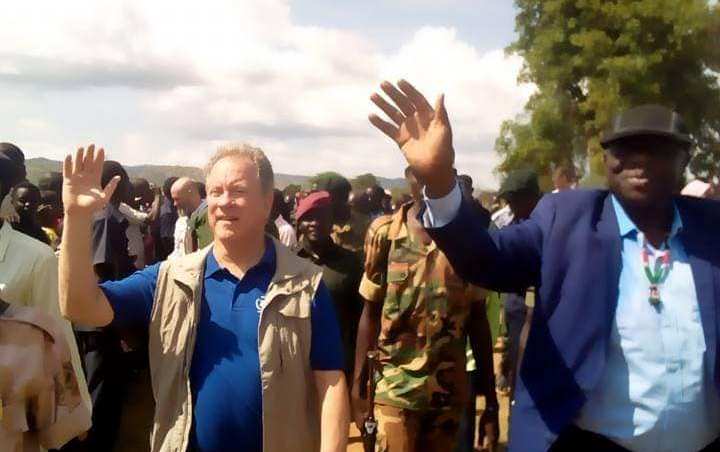Sudan allows WFP chief to visit rebel-held area in South Kordofan

October 23 (KHARTOUM) – The Sudanese government said on Wednesday it had for the first time since June 2011 allowed an international official to reach a stronghold of the SPLM-North in South Kordofan.
“The government has for the first time allowed the Executive Director of the United Nations World Food Program (WFP) David Beasley to visit the Kauda aera,” information Minister Faisal Mohamad Saleh told reporters after the cabinet meeting.
Kauda area of South Kordofan State is the main stronghold of the SPLM-N led by Abdel Aziz al-Hilu.
A video watched by the Sudan Tribune showed the UN official dancing with SPLM-N leader Abdel Aziz al-Hilu, who received him in Kauda amid a public ceremony.
The Minister of Information said that the move comes within the framework of the government’s keenness to facilitate the arrival of humanitarian aid to all citizens in any region in Sudan.
The parties agreed under the Juba Declaration signed last September to implement confidence-building measures including opening the humanitarian access to the civilians in the war-affected areas.
On Friday 18 October, the Sudanese government and SPLM-N signed a document setting out the negotiating agenda, which was divided into three themes: political issues, humanitarian issues, and security arrangements.
The document also stipulates that both sides should agree on a declaration of principles as a roadmap for the negotiating process.
In a tweet posted after his visit to Kauda, WFP chief David Beasley thanked the Sudan Prime Minister Abdallah Hamdok, the head of the Sovereign Council, General Mohamed Hamdan Daglo, South Sudan President Salva Kiir, the South Sudanese govt and SPLM-N for facilitating the visit.
“Another historic day in Sudan! We just completed the 1st UN humanitarian mission into Kauda, South Kordofan in 8 years”.
“Extraordinary cooperation made this possible, and we hope to see more moving forward. A brighter future for Sudanese people depends on it,” he stressed.
The mediation suspended the peace talks on the declaration of principles until next November as the parties failed to agree on the inclusion of the secular state in the talks.
The SPLM-al-Hilu called to include the relationship between the religion and state in the talks while the transitional government delegation said the matter would be discussed in the constitutional conference.
“The most important outcome of the (latest) negotiation round is the signing of a joint agreement with the SPLM-N al-Hilu to cease hostilities,” said Saleh.
He further said that the Sudanese Council of Ministers directed the preparation of working papers and plans to help the success of the next rounds of negotiations with the armed groups in Juba.
The minister who is the government spokesman pointed out that the progress achieved in the talks reflects the strong political will of all parties involved in the process and the desire to reach a lasting, comprehensive and rapid peace.
He noted that the Council of Ministers had also been briefed by the ministers concerned with the four pillars of the peace process, namely security arrangements, political axis, legislation, laws and economic development.
For his part, member of the Sovereign Council, Mohamed Hassan Eltaishi who is also the spokesman for the government negotiating delegation told reporters that they received the response of the SPLM-N al-Hilu, on the roadmap that would govern the negotiations in the coming rounds.
Speaking after the return of the negotiating delegation from Juba, Eltaishi added that the SPLM-N al-Hilu handed over a draft declaration of principles that define the ceiling and framework of the would-be a peace agreement.
He stressed that the discussions with the Movement’s delegation in Juba reinforced confidence and strengthened the common will towards peace.
Further, he described the latest round of negotiations as successful and “exceeded the expectations of many.”
(ST)
